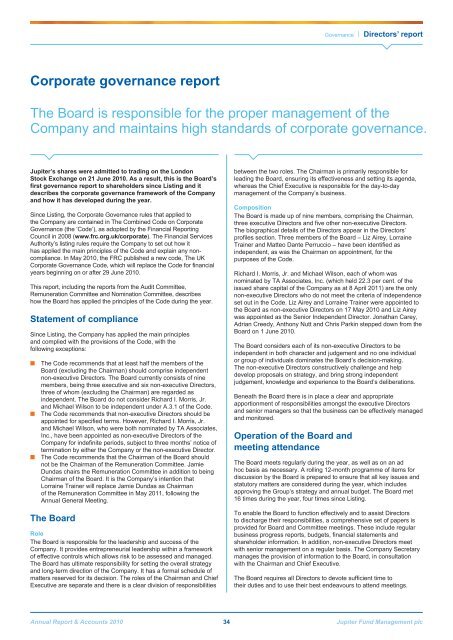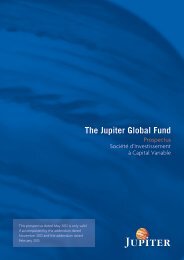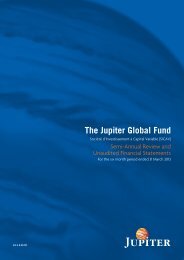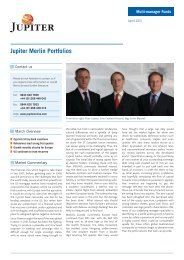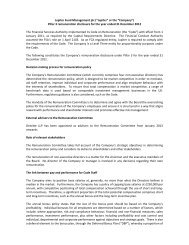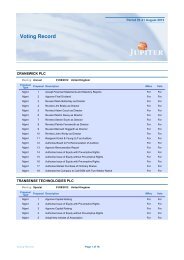Jupiter Annual Report 2010 - Jupiter Asset Management
Jupiter Annual Report 2010 - Jupiter Asset Management
Jupiter Annual Report 2010 - Jupiter Asset Management
You also want an ePaper? Increase the reach of your titles
YUMPU automatically turns print PDFs into web optimized ePapers that Google loves.
Governance | Directors’ report<br />
Corporate governance report<br />
The Board is responsible for the proper management of the<br />
Company and maintains high standards of corporate governance.<br />
<strong>Jupiter</strong>’s shares were admitted to trading on the London<br />
Stock Exchange on 21 June <strong>2010</strong>. As a result, this is the Board’s<br />
first governance report to shareholders since Listing and it<br />
describes the corporate governance framework of the Company<br />
and how it has developed during the year.<br />
Since Listing, the Corporate Governance rules that applied to<br />
the Company are contained in The Combined Code on Corporate<br />
Governance (the ‘Code’), as adopted by the Financial <strong>Report</strong>ing<br />
Council in 2008 (www.frc.org.uk/corporate). The Financial Services<br />
Authority’s listing rules require the Company to set out how it<br />
has applied the main principles of the Code and explain any noncompliance.<br />
In May <strong>2010</strong>, the FRC published a new code, The UK<br />
Corporate Governance Code, which will replace the Code for financial<br />
years beginning on or after 29 June <strong>2010</strong>.<br />
This report, including the reports from the Audit Committee,<br />
Remuneration Committee and Nomination Committee, describes<br />
how the Board has applied the principles of the Code during the year.<br />
Statement of compliance<br />
Since Listing, the Company has applied the main principles<br />
and complied with the provisions of the Code, with the<br />
following exceptions:<br />
■■<br />
■■<br />
■■<br />
The Code recommends that at least half the members of the<br />
Board (excluding the Chairman) should comprise independent<br />
non-executive Directors. The Board currently consists of nine<br />
members, being three executive and six non-executive Directors,<br />
three of whom (excluding the Chairman) are regarded as<br />
independent. The Board do not consider Richard I. Morris, Jr.<br />
and Michael Wilson to be independent under A.3.1 of the Code.<br />
The Code recommends that non-executive Directors should be<br />
appointed for specified terms. However, Richard I. Morris, Jr.<br />
and Michael Wilson, who were both nominated by TA Associates,<br />
Inc., have been appointed as non-executive Directors of the<br />
Company for indefinite periods, subject to three months’ notice of<br />
termination by either the Company or the non-executive Director.<br />
The Code recommends that the Chairman of the Board should<br />
not be the Chairman of the Remuneration Committee. Jamie<br />
Dundas chairs the Remuneration Committee in addition to being<br />
Chairman of the Board. It is the Company’s intention that<br />
Lorraine Trainer will replace Jamie Dundas as Chairman<br />
of the Remuneration Committee in May 2011, following the<br />
<strong>Annual</strong> General Meeting.<br />
The Board<br />
Role<br />
The Board is responsible for the leadership and success of the<br />
Company. It provides entrepreneurial leadership within a framework<br />
of effective controls which allows risk to be assessed and managed.<br />
The Board has ultimate responsibility for setting the overall strategy<br />
and long-term direction of the Company. It has a formal schedule of<br />
matters reserved for its decision. The roles of the Chairman and Chief<br />
Executive are separate and there is a clear division of responsibilities<br />
between the two roles. The Chairman is primarily responsible for<br />
leading the Board, ensuring its effectiveness and setting its agenda,<br />
whereas the Chief Executive is responsible for the day-to-day<br />
management of the Company’s business.<br />
Composition<br />
The Board is made up of nine members, comprising the Chairman,<br />
three executive Directors and five other non-executive Directors.<br />
The biographical details of the Directors appear in the Directors’<br />
profiles section. Three members of the Board – Liz Airey, Lorraine<br />
Trainer and Matteo Dante Perruccio – have been identified as<br />
independent, as was the Chairman on appointment, for the<br />
purposes of the Code.<br />
Richard I. Morris, Jr. and Michael Wilson, each of whom was<br />
nominated by TA Associates, Inc. (which held 22.3 per cent. of the<br />
issued share capital of the Company as at 8 April 2011) are the only<br />
non-executive Directors who do not meet the criteria of independence<br />
set out in the Code. Liz Airey and Lorraine Trainer were appointed to<br />
the Board as non-executive Directors on 17 May <strong>2010</strong> and Liz Airey<br />
was appointed as the Senior Independent Director. Jonathan Carey,<br />
Adrian Creedy, Anthony Nutt and Chris Parkin stepped down from the<br />
Board on 1 June <strong>2010</strong>.<br />
The Board considers each of its non-executive Directors to be<br />
independent in both character and judgement and no one individual<br />
or group of individuals dominates the Board’s decision-making.<br />
The non-executive Directors constructively challenge and help<br />
develop proposals on strategy, and bring strong independent<br />
judgement, knowledge and experience to the Board’s deliberations.<br />
Beneath the Board there is in place a clear and appropriate<br />
apportionment of responsibilities amongst the executive Directors<br />
and senior managers so that the business can be effectively managed<br />
and monitored.<br />
Operation of the Board and<br />
meeting attendance<br />
The Board meets regularly during the year, as well as on an ad<br />
hoc basis as necessary. A rolling 12-month programme of items for<br />
discussion by the Board is prepared to ensure that all key issues and<br />
statutory matters are considered during the year, which includes<br />
approving the Group’s strategy and annual budget. The Board met<br />
16 times during the year, four times since Listing.<br />
To enable the Board to function effectively and to assist Directors<br />
to discharge their responsibilities, a comprehensive set of papers is<br />
provided for Board and Committee meetings. These include regular<br />
business progress reports, budgets, financial statements and<br />
shareholder information. In addition, non-executive Directors meet<br />
with senior management on a regular basis. The Company Secretary<br />
manages the provision of information to the Board, in consultation<br />
with the Chairman and Chief Executive.<br />
The Board requires all Directors to devote sufficient time to<br />
their duties and to use their best endeavours to attend meetings.<br />
<strong>Annual</strong> <strong>Report</strong> & Accounts <strong>2010</strong> 34 <strong>Jupiter</strong> Fund <strong>Management</strong> plc


